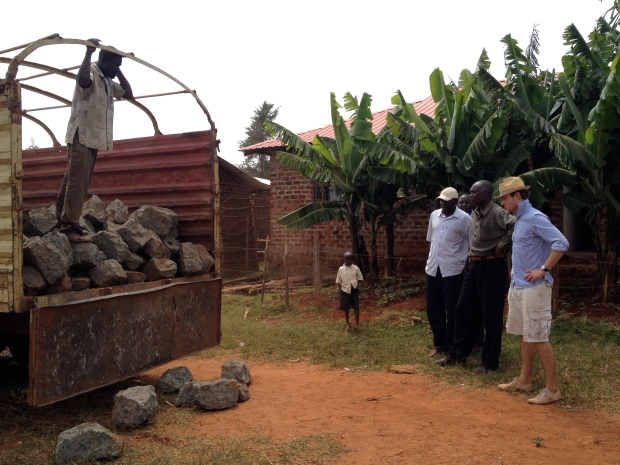When is the right price not the right price?
Sometimes things really are too good to be true. Often, if the price of something is too low, it is too low for a reason.
Many times while working in investment management my then boss would tell me “it may be a bargain William, but that price is telling you something”. Often he was right; the depressed price was a signal that there was an underlying problem with the company of which we were unaware.
Most recently, this happened to me in Kenya. I was getting stuck into my second week of the CBSM primary school build. We had established a good network of suppliers and barring a few minor problems with undersize foundation stones, things were going well.
However, money was tight (donations are most welcome by the way) and we were keen to save costs. Interestingly, in Kenya the cost base for a build is inverted to what you would find in Europe. There, labour is cheap and materials are incredibly expensive. For instance, our unskilled labourers were earning 250KSH per day –roughly €2.50 a day. A bag of concrete costs in the region of KSH800 or €8.00.
The foundations require vast quantities of aggregate (stone chips) and these arrived at site in 30 tonne loads. Initially, we had negotiated a price of KSH2,500 per tonne with our supplier Joseph, he always delivered on time, kept us in touch if there was a problem, and the goods were always to the right quality. By this time however, the build was attracting lots of local (unwanted) interest. People in shirts (as opposed to t-shirts) were turning up to the site. An unusual spectacle in this poor area, these turned out to be local suppliers who brazenly informed me that it was my “duty” to give them some business as it was a “community project”. I was reluctant to change suppliers as we had already established a simple functioning supply chain, with good stock control and I didn’t like their attitude. However, I am always interested to know the market price for goods so I asked for quotes for aggregate from two of the “shirts”. Kebaba bid KSH2,300 per tonne and Joshua bid KSH2,400.
At first glance, here was a considerable saving to be made. Potentially we could save KSH6,000 per load. I was still unwilling to change suppliers. Besides, the local Kenyan team didn’t know these two locals. I decided to have a meeting with our trusted existing supplier Joseph. I decided to adopt an open book policy and presented him with the two quotes and asked if him for his thoughts. He looked at the paper, paused for a while and then reduced his price by KSH100 per tonne. He complained that the lowest bid was too low, there was simply no profit in that deal for the supplier after transport and other costs were added. Now, better understanding his supply chain, I could make a balanced decision. I therefore accepted Joseph’s bid of KSH2,400 told the other suppliers that our books were closed and asked them to leave the site.
The next day there was an uproar! Whilst I was procuring steel from Bungoma, the police had arrived and finding Kebaba (the low bidder) at the gates to the site, arrested him. Allegedly, he had been stealing aggregate (diverting lorries) from a government site. Had we taken Kebaba’s offer, there could have been serious repercussions not only for the build but also for the charity.
When dealing with suppliers it is important to understand their costs and know their business. Japanese companies such as Toyota are well known for taking a long-term view on business relationships and for the high transparency of the bidding process. For instance they often build-in an accepted profit margin into a deal. Moreover, if they then ask for further cost savings they will work with the supplier to ensure that these can be met and not at a price which damages the long term future of the supplier. After all, we want to ensure that suppliers can deliver in the long-term on cost, quality, time and also invest in their businesses. Ultimately this will be to our benefit too. The diagram below shows an “open book” 2 way communication strategy which can be used when dealing with suppliers as suggested by Lamming (1996).
Sako (1992) in his analysis of UK and Japanese firms found that 3 types of trust are needed for good buyer-supplier relationships:
1. Contractual trust – the adherence to formal, legal promises
2. Competence trust – that either side is capable of delivering what has been prominsed.
3. Goodwill trust – which borders on “ethics”, trusting that appropriate behaviour will ensue.
Joseph is such a supplier. He delivers on time, on cost and to the required quality. I trust him and we communicate well; both giving and receiving information on the build. I also noticed that his trucks were in good condition and his employees were well looked after. Here is a man who is building his company for the future. Hopefully next time I receive a low bid from a supplier it will act as a warning light and I will be on my guard. In finance we have a term “KYC” for Know Your Customer, I think my experience in Kenya has taught me that the acronym “KYS” Know Your Supplier is equally valid.
Further reading:
Sako, M. (1992) Prices, Quality and Trust: Inter-firm relations in Britain and Japan. Cambridge. Cambridge University Press.
Brown, S, Lamming, R, Bessant, J and Jones, P. (2006) Strategic Operations Management, 2nd Edition, Elsevier Butterworth-Heineman. Oxford. UK
Next: Succession planning: The King is dead, long live the King!





